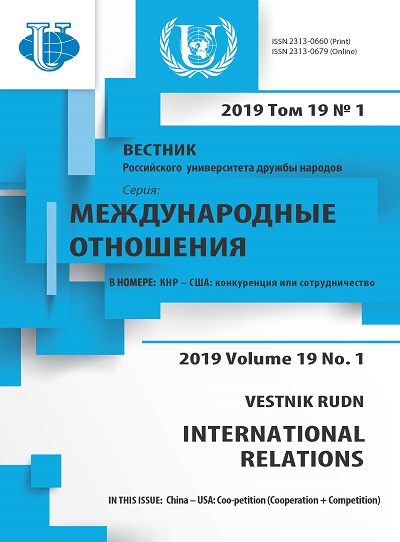A New Cold War? Causes and Future of the Emerging US-China Rivalry
- Authors: Suisheng Z.1, Guo D.2
-
Affiliations:
- University of Denver
- Party School of the Central Committee of C.P.C (Chinese Academy of Governance)
- Issue: Vol 19, No 1 (2019): China — USA: Coo-petition (Cooperation + Competition)
- Pages: 9-21
- Section: THEMATIC DOSSIER
- URL: https://journals.rudn.ru/international-relations/article/view/20848
- DOI: https://doi.org/10.22363/2313-0660-2019-19-1-9-21
- ID: 20848
Cite item
Full Text
Abstract
The Trump Administration declared China a strategic competitor and a revisionist power. It escalated a trade war to a fullfrontal clash with China. Some experts qualified it as a new Cold War between the US and China. Both countries are undergoing dramatic transformation. Their destinations will determine the course and outcome of the emerging US-China rivalry. This article argues that while engagement is now defined by competitive interests, the profound interdependence continues underpinning the bilateral relationship. Although there is no precedent to guide economic and geostrategic competition between the two largest and deeply intertwined economies and heavily militarized superpowers, the US and China must find some balance of interests with each other and avoid violent confrontation that serves neither’s interest. This level of engagement requires vision and flexibility. With strong economic interdependence, the existence of an international institutional order, limited ideological confrontation, and nuclear second-strike capability, leaders of two countries have no choice but find ways to manage their competition and continue futher engagement with each other. Authors conclude that the stronger China grows, the harder it gets for Washington to force it back down. Driving PRC into a corner is the way to make China even tougher. So it could cause more severe consequences for both countries.
Keywords
About the authors
Zhao Suisheng
University of Denver
Email: cambridgeyd@163.com
Professor and Director of the Center for China-US Cooperation, Josef Korbel School of International Studies, University of Denver
Dan Guo
Party School of the Central Committee of C.P.C (Chinese Academy of Governance)
Email: cambridgeyd@163.com
Ph.D. Candidate, the International Strategic Research Institute and of the Graduate School, Party School of the Central Committee of CPC (Chinese Academy of Governance), Visiting scholar at University of Denver
References
- Allison, G. (2018). How Trump Could Stumble from a Trade War to a Real War. National Interest. URL: http://nationalinterest.org/feature/how-trump-could-stumble-trade-war-real-war-china-25481?page=show (accessed: 07.09.2018).
- Bader, J. (2018). US-China Relations: Is it Time to End Engagement? Brookings Institution Policy Brief. URL: https://www.brookings.edu/wp-content/uploads/2018/09/FP_20180925_us_china_relations.pdf (accessed: 07.09.2018).
- Campbell, K.M. & Ratner, E. (2018). The China Reckoning, How Beijing Defied American Expectations. Foreign Affairs, 97 (2).
- Doshi, R. (2017). Trump’s China Policy: A Tale of Two Extremes. URL: http://nationalinterest.org/feature/trump-mustchoose-between-hard-line-china-strategy-soft-20002?page=2 (accessed: 07.09.2018).
- Freeman, C.W. Jr. (2017). The United States and China: Game of Superpowers, Remarks to the National War College Student Body. URL: http://chasfreeman.net/the-united-states-and-china-game-of-superpowers/ (accessed: 07.09.2018).
- Hu Angang, Zhen Yunfeng & Gao Yuyu (2015). Dui Zhongmei zonghe guolide pinggu [Assessing Comprehensive National Strength of China and the US]. The Journal of Qinghua University, 1, 26-39. (In Chinese).
- Lampton, D.M. (2017). Balancing US-China interests in the Trump-Xi era. East Asia Forum. URL: http://www.eastasiaforum.org/2017/12/10/balancing-us-china-interests-in-the-trump-xi-era/ (accessed: 07.09.2018).
- Lampton, D.M. (2015). A Tipping Point in U.S.-China Relations is Upon Us. US-China Perception Monitor. URL: http://www.uscnpm.org/blog/2015/05/11/a-tipping-point-in-u-s-china-relations-is-upon-us-part-i/#_ftnref5 (accessed: 07.09.2018).
- Li, E.X. (2014). The Middle Kingdom and the Coming World Disorder. New Perspectives Quarterly, 31, 26-30. doi: 10.1111/npqu.11443.
- Mearsheimer, J. (2018). The Great Delusion, Liberal Dreams and International Realities. New Heaven, NY: Yale University Press, 2018.
- Moeller, J.O. (2018). The End of the Atlantic Alliance. The National Interest. URL: http://nationalinterest.org/feature/the-endthe-atlantic-alliance-25993?page=2 (accessed: 07.09.2018).
- Pillsbury, M. (2015). The Hundred-Year Marathon, China’s Secret Strategy to Replace America as the Global Superpower. Henry Holt and Co.
- Sutter, R. (2018). America and China: Destined for Conflict or Cooperation? The National Interest. URL: https://nationalinterest.org/feature/america-and-china-destined-conflict-or-cooperation-we-asked-14-worldsmost-renowned-experts (accessed: 07.09.2018).
- Tunsjø, Ø. (2018). The Return of Bipolarity in World Politics: China, the United States, and Geostructural Realism. Columbia University Press.
- Wang, J.S. (2018a). America and China: Destined for Conflict or Cooperation? The National Interest. URL: https://nationalinterest.org/feature/america-and-china-destined-conflict-or-cooperation-we-asked-14-worldsmost-renowned-experts (accessed: 07.09.2018).
- Wang, J.S. (2018b). Did America Get China Wrong: The View from China. Foreign Affairs. URL: https://www.foreignaffairs.com/articles/china/2018-06-14/did-america-get-china-wrong (accessed: 07.09.2018).
- Xie, T. (2018). America and China: Destined for Conflict or Cooperation? The National Interest. URL: https://nationalinterest.org/feature/america-and-china-destined-conflict-or-cooperation-we-asked-14-worldsmost-renowned-experts (accessed: 07.09.2018).
Supplementary files










